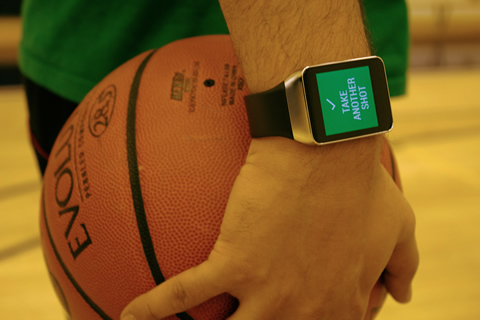Growing up in Waterloo, Ontario, Marissa Wu (BASc 2013) loved to play basketball with her father. “I wanted to be Michael Jordan,” laughs the 22-year-old co-founder and CEO of Onyx Motion. The problem was that she wasn’t very good at sports. “I never understood why.”
Wu wondered if athletic prowess wasn’t just about innate skill. As she completed her degree, she decided to apply data analytics to the art of executing a layup. “I wanted to tackle the problem of knowing what you’re doing wrong.”
The result is a “digital coach” Android app designed to be loaded onto wearable tech devices, including the soon-to-be-released Apple Watch. Wu and co-founder Vivek Kesarwani (BASc 2014), who is also the company’s chief technology officer, built the software as part of The Next 36 entrepreneurial leadership program. Worn while shooting hoops or playing golf, the app offers athletes tips on how to improve technique based on a real-time analysis of the user’s performance.
Watch Onyx Motion’s Marissa Wu and Vivek Keserwani on CBC’s Next Gen Dragon’s Den, starting at 6:25
Wu likens the state of wearable technology to the earliest cell phones. Activity trackers, such as Fitbit, a wristband gadget, generate measurements and stats, such as steps taken. But “there has to be more meaning and context,” Wu says.
With Onyx Motion, she and Kesarwani sought to develop an app that would take the wearer’s motion data and combine this information with similar data collected from professional athletes and other users of the app. By digitally comparing the motions that went into delivering a shot or swing to those of other athletes of similar size, and then having users indicate a missed attempt with a shake of the wrist, Onyx Motion produces ratings and suggestions – for example, using a steeper angle or faster throw.

In beta tests, Wu says, 200 basketball players using the app boosted their successful free-throw percentage by an average of 60 per cent. When Wu tried the app with her own game, it identified ball speed as the shortcoming. “What I learned is that my biggest problem is not my precision” (measured by the angle of her throw), Wu says. “It’s that I lack strength.” Indeed, after she began a weight-training program for her arms and back, her successful free-throw percentage jumped from 30 to 60.
Elite athletes receive one-on-one training and benefit from sophisticated technologies designed to deconstruct their movements, but average people have no access to this kind of coaching. Until now. Wu also sees applications outside sports, too, such as coaching people with injuries to do physiotherapy exercises properly.
Mostly, she believes the value in the technology lies in its artificial intelligence, which allows Onyx Motion to determine whether its advice is helpful. “We look at whether our tip is actually making you improve,” she says. “If it doesn’t work, or makes you worse, then the watch learns and adapts. That’s the human element that Fitbit hasn’t been able to replicate.”
Watch Onyx Motion’s “digital coach” in action






